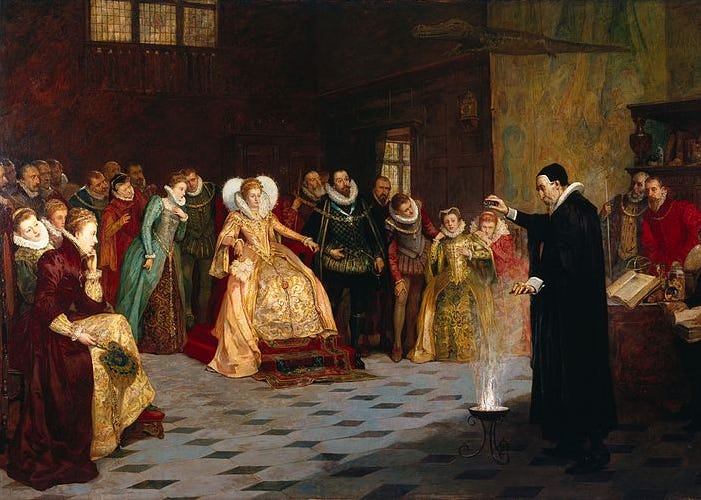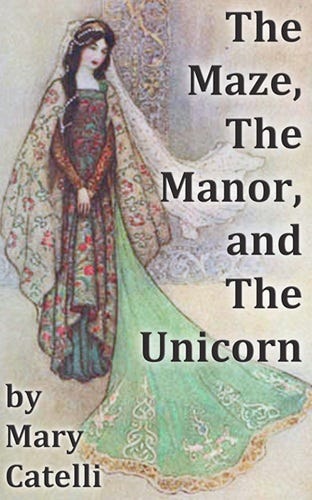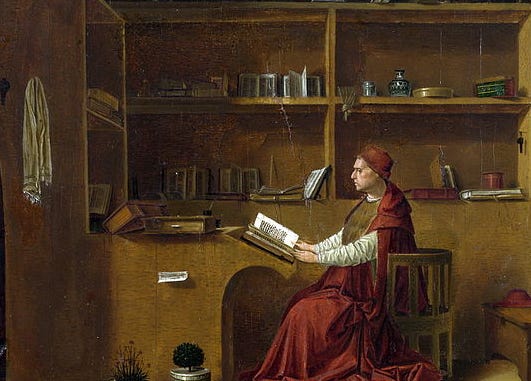There you are, reading a history book for your research,1 and an incident happens. And like an incident in a novel, you want to rip it off. I do that myself. And then I plop it into a high fantasy.
Part of it is the same motives as stealing an incident from a novel -- the potential there was completely wasted -- and of course a new setting lets you pull it free from the historical setting, where what happened, happened, however dull or contrived or melodramatic the causes and consequences were. Or for that matter, how unpleasant, or inconsistent, or dull the actors in the event were.
The problem with the historical event may be that it's hotly disputed, so, for story purposes, you have not one event, but five or six different ones. The king dissolving the kingdom's parliament can be spun as the king's justly protecting the commons from the nobles' overbearing tyranny, or the king's tyrannically depriving the nobles of the power to protect the commons from injustice, or the king and nobles' squabbling over power and making life more difficult for the commons -- but unless your actual story is far enough away that these are just rumors in the background, you have to pick one or at least smooth out incongruities.
At the extreme, the incident may be totally debunked. You may run across mention of it as a previously popular theory, or you may run across an old work, before the debunking, or in a crackpot writer who refuses to accept the debunking -- say, one of the more odd-ball ideas about who the man in the iron mask was.
By plopping the incident in a new setting, you get to pick, and even pick the least likely of the explanations, without worrying that the dispute will distract your readers, especially if it's later settled against your position. (Well, not too worried. Some people may recognize it, and some lunatics will even argue that you got it wrong. Such people are like being caught in an open field during a downpour; you will get wet, so there's no point in frantically trying to escape.)
Then you can easily add or remove things, even utter historical impossibilities, to make it more credible in the new setting. Changing characterization. Adding magical limits or powers. Implementing scientific tests. Altering laws. Whatever floats your boat and makes it work.
On the other hand, the problem may be that while you are reading, the fact is given in isolation. You may read a fact that could issue in all sorts of stories -- that a queen expected her ladies-in-waiting to demand bribes to pass on petitions to her, in order that they might have money to gamble with her -- but it's in a discussion of petitions, and does not mention any actual times where the ladies did accept bribes, or discuss the gambling with so much as the game involved. You may have to do in-depth research to find out anything more, and the information may not actually be in the historical record.
You could, of course, still give the incident a historical treatment, without even shifting the time and place. Some people prefer researching the details and interpolating what they need to. Certainly the genre of historical fiction is venerable and furthermore chugging onward. You can even introduce some elements such as Doctor Dee actually performing functional magic for Queen Elizabeth and get away with it.
I personally always do it in another world because I prefer to build out the idea myself. And elide the historical aspects that I want. And basically, treat it like an idea I stole from another work of fiction.
I ran across an idea once while reading about Elizabethan England. Queen Elizabeth did not like it when her ladies-in-waiting married, and they needed her permission to do so. Indeed, once she was so angry with a lady-in-waiting when the woman asked permission that she broke her finger.
Which incident leapt from history into story idea. It dragged along a few other things with it, such as the queen's unmarried state and the problem with her heir. It mixed itself up a few other things, such as folklore seldom used in fantasy, as you may guess when I tell you the tale's title is The Maze, the Manor, And the Unicorn. Available at Amazon, Barnes & Noble, Apple Books, Kobo, Everand, Smashwords, and many other fine online venues
And among other elements, the incident graciously faded back into the backstory and does not appear in the story itself. Such is inspiration.
Wise of you
Second-Hand Sources
Most books of history are secondary source, written by people not of the era that they write of, drawing on the sources of that era. And it can be of great use to the writer.






